May 2014 Visa Bulletin is out
May 2014 Visa Bulletin was announced on April 9, 2014.
You can check the priority date for your visa type Here


May 2014 Visa Bulletin was announced on April 9, 2014.
You can check the priority date for your visa type Here

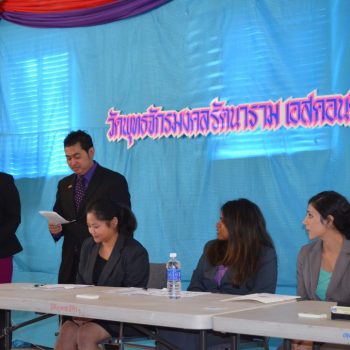
On February 9, 2014, the Access to Law Initiatives (“ALI”) and Thai American and Asian Alliance of San Diego (“Thai SD“) hosted a free seminar on the U.S. immigration law and the new Affordable Care Act (“ACA”) at Wat Buddhajakramongkolrattanaram (“Wat Thai SD”) in Escondido, CA. The purpose of this seminar is to educate people in Thai community in Southern California about the basic immigration laws and the new Affordable Care Act. Attorney Tammy was a speaker on the “Immigration 101” forum.
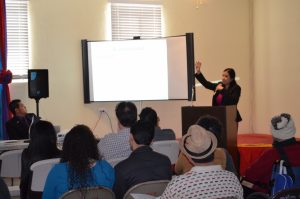
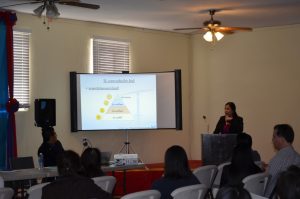
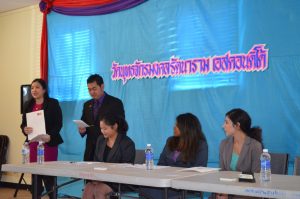


Attorney Sumontha with Ms. Bonnie Dumanis, San Diego District Attorney.
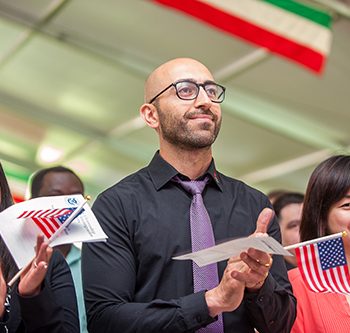
The Department of State announces today (May 2, 2012) the list of persons who are selected under the Diversity Immigrant Visa Program (as known as Green Card Lott). Check your status now!
1. Go to U.S. Department of State website – Click here
2. Enter your confirmation number, your last name and your date of birth.
Don’t be sad if you not selected this time!
The Department of State may select more on October 1, 2012.
Keep you confirmation number and wait to check again.
BRIEF INFO ABOUT GREEN CARD LOTTO
The Department of State selected randomly among the entries to persons who meet strict eligibility requirements from countries with low rates of immigration to the United States. Initial qualifications are that the person must have at least:
1. A high school education or its equivalent; or
2. 2 years of work experience within the past 5 years in an occupation requiring at least 2 years’ training or experience.
Statistic for Thai immigrants who were selected:
Contact us now to inquire about your chances or if you are interested in entering the Diversity Visa Program.
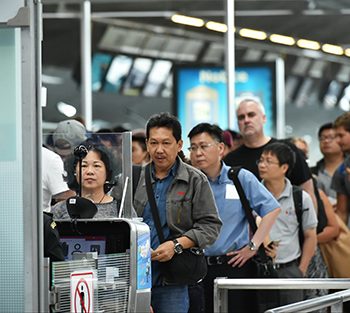
Recently, AILA created a short video”The Impossible Dream: U.S. Visas for Foreign Entrepreneurs” and asked for feedback. The idea is to gather feedback in hopes that Congress will, eventually, create visas for foreign entrepreneurs. The video tells a story of ‘Danny’, a young man who came to the U.S. and attended a business school in an entrepreneur program. He was at the top of his class at school and he had already launched his business by the end of the program, but his student visa would expire and he would have no choice but to leave the U.S. Although it is possible that his business could create more jobs (hiring more task force, creating more financial flows to the U.S. economy), a proper visa for him to stay in the U.S. does not exist. As we all know, foreigners cannot petition himself or herself for an H1B visa (known as the employer sponsorship rule), an employer must be the petitioner. Danny is the owner of the company, so he cannot sponsor himself for an H1B visa.
What the video does not mention is Danny could find another option to stay in the U.S. with a possible opportunity that could turn into a permanent residency. As a foreign graduate under a student visa , Danny could apply for an Optional Practical Training (OPT) and work for up to 12 months without having to apply (and be approved) for an H1B visa. (Since this blog is not about OPT, I will discuss OPT later.) An option with OPT and H1B is a long and difficult process. Shouldn’t there be an easier way to obtain a visa as an entrepreneur?
According to research by the Duke University Master of Engineering Management program, immigrant entrepreneurs founded 25.3% of engineering and technologies companies between 1995 and 2005. Take a look at the technology companies in Silicon Valley, where it is known to be one of the U.S. hub for technology engineers, more than 50% of businesses there have at least one immigrant as their key founders. So why not have a visa option available to keep these entrepreneurs in the U.S. to create more jobs for the economy?
What AILA is trying to achieve through its video is nothing new. In March 2011, several bills were proposed with hopes to better the U.S. economy and to ease entrepreneur visa eligibility criteria. In 2011, The StartUp Visa Act was proposed, however it was not passed. While several countries in Europe as well as Canada, have long made an entrepreneur visa available for immigrants without the employer sponsorship rule, the U.S. is still struggling and indecisive in passing those bills. Although the new EB-5 investment visa is already in place, the eligibility requirements are high.
Several attempts and ideas from various fields have been poring in to help the U.S. economy get back on its feet. History has also shown that immigration law is definitely a part of it. Each day without this new law could mean the U.S. is losing immigrants and job-creating opportunities to other countries. When will the new Entrepreneurs Visa available? We shall wait and see.
Contact us now to discuss your immigration situations and find out what options may be available to you.

On June 15, 2012, Secretary of Homeland Security Janet Napolitano announced that the government will defer the removal of certain qualifying high school students or older who entered the U.S. as children without status, do not have disqualifying criminal records, and who are under the age of 30. The policy (NOT A LAW) does not confer legal status, a visa, or a path to permanent residency. However, it offers much deserved hope for countless of students and their families. Individuals who came to the United States as children and meet the guidelines below may be eligible for deferred action status.
GUIDELINES: You may request consideration of deferred action for childhood arrivals if you:
*** If grant, deferred action will be for a 2 year period, with the possibility of renewal, which will be considered on an individual basis.
Frequently Asked Questions
1. PEOPLE CURRENTLY IN REMOVAL PROCEEDINGS
People currently in removal proceedings will use the USCIS process when it is implemented on August 15, 2012, rather than go through ICE. Only individuals in
detention will go through ICE to make a deferred action request.
2. INFORMATION PROVIDED WILL NOT BE DISCLOSED
Information provided as part of the deferred action request process is protected from disclosure to ICE or CBP for purposes of removal proceedings unless the requestor meets the criteria of USCIS’ November 2011 NTA memo.
3. “CONTINUOUSLY PRESENT”
Short absences before August 15, 2012, reasonably calculated to accomplish the purpose of the trip, would not be interuptive. If a departure from the U.S. was due to removal, voluntary departure, etc., the absence was not brief, casual and innocent and would interupt the continuous residence that is required since June 15, 2007.
4. ELIGIBILITY: Immigration Status
Only people who are currently not in status and were not in any lawful status on June 15, 2012 are eligible.
5. DEFINITION OF “SIGNIFICANT MISDEMEANOR”
A “significant misdemeanor” is one for which the individual was sentenced to more than 90 days, or a conviction for domestic violence, sexual abuse, burglary, firearm violation, drug distribution or trafficking (but not possession), or DUI, regardless of the sentence. Therefore,minor traffic offenses, such as driving without a license, are not considered misdemeanors that count toward the “3 or more” standard.
6. FORM THAT WILL BE USED: WILL ANNOUNCE ON AUGUST 15, 2012
Applicant can submit their application by using a form that will be made available on August 14 or 15, along with the Form I-765, including biometics, which will be $465. Fee waivers will not be available, but fee exemptions will be permitted in very limited circumstances, and must be requested and approved before submitting a deferred action application without a fee.
7. “CUT OFF” DATE
Whether a person has reached age 15, and whether the requestor meets the education requirements, will be determined as of the date the request for deferred action is filed, NOT the June 15, 2012 date.

The Royal Thai Consulate General, Los Angeles has been receiving inquiries from Thai citizens residing in the United States regarding the guideline for Thai citizens who hold both Thai passport and U.S. passport. The question was asked specifically in the event that Thai citizens travel to and from Thailand, which passport should be used as travel identification document.
Please be advised that Thai immigration officers will inspect and put immigration stamps only on one passport book which was used at arrival and departure inspection booths. Pursuant to Thailand’s Nationality Act, B.E 2508, Thailand does not recognize dual citizenship. Therefore, if a person uses his or her Thai passport book when arriving Thailand, he or she has to use the same Thai passport book when departing Thailand. Vice versa, if a person uses his or her U.S. passport book when arriving Thailand, he or she must use the same U.S. passport book when departing Thailand in order to receive appropriate immigration stamps.
Please be advised and follow the above guideline.
The Royal Thai Consulate General, Los Angeles
PLEASE NOTE: The above message was translated to convey material contents from the actual press release. The author certifies that she is fluent in Thai, but is not responsible for authentication of the document. Please contact author if you would like to receive an electronic copy of the press release.